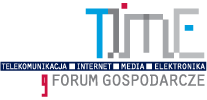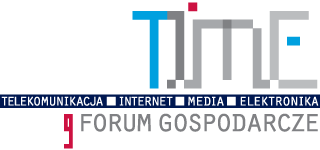The 9th TIME Economic Forum is a common project of the two main chambers of commerce for the digital industry in Poland, that is, the National Chamber of Commerce of Electronic Industry and Telecommunication (KIGEiT) and the Polish Chamber of Information Technology and Telecommunications (PIIT). Our goal is to shape the specialisation of the Polish digital industry, according to its possibilities and aspirations. The aim of all the previous editions of the TIME Economic Forum (TIME EF) was to present the achievements of the Polish industry and to discuss the possible directions of development of the ICT industry (electronics, communications and information technologies).
In 2015, during the 7th TIME Economic Forum, we presented a draft of the Programme for Digital Development of Industry and Infrastructure (PRCIP). The goal of the Programme is to support digital and innovative economic growth through the development of economic innovations, creation of an industry specialisation and integrated digitisation of the technical infrastructure.
In 2016, during the 8th TIME EF, we presented the keynote presentation that together constituted a report from the first six months of the PRCIP implementation. As a result, the IUSER Sector Programme was elaborated, the goal of which is to develop the Polish industry specialisation, related to the necessity of modernisation and digitisation of the critical infrastructure, especially the end-user power infrastructure.
We proved that the digitisation process, perceived as the third stage of the Industrial Age is gradually coming to an end. In this way we wanted to demonstrate that the development of smart software commences a period of radical changes, not of technological, but also of economic and social character, which will probably be larger and more important than the changes that have taken place so far and that have been related to the fact of entering the era of industrial development. The extent to which the entire country will be prepared for the upcoming changes shall determine the future of Poland. That is why, this year’s TIME Economic Forum shall be dedicated to the issue of artificial intelligence.
The ability to absorb and develop smart software shall determine not only the level of innovation and the pace of the development of the Polish economy, but also the welfare of the society. Owing to the rapid development of the artificial intelligence, the influence of the digital sector on the innovativeness of the entire industry and infrastructure will be even more pronounced. The goal of the 9th TIME EC is to promote organisational activities and legislation initiatives that will greatly influence the decisions on how to support the concept of industrial transformation, developed by the Ministry of Development and the Ministry of Digital Affairs. We believe that the effectiveness of these actions will depend on the consistency of laws regulating the conditions of market functioning with the regulations pertaining to the areas in which market mechanisms have proven to be ineffective, inappropriate or not applicable.
The most important and the most obvious goal is to accelerate the pace of construction of the fibre infrastructure. By presenting our priorities in graphic form, we want to emphasize that the redistribution factor is essential for innovation and for raising the level of competence in the field of artificial intelligence.

The scope of subjects relating to the implementation and development of smart software is very wide. The programme of this year’s TIME EC focuses on the areas that need to be dealt with today and that require important legislative decisions.
The programme of 9th TIME EC expresses the need of entrepreneurs to develop conditions favouring the development of innovations and focuses on eight subject areas. The subjects below are of the main focus to all the work groups constituting the Group for the Industrial Transformation appointed by the Minister of Development.
- Creation of a universal infrastructure providing access to ultra high speed broadband Internet 1 Gbps+
- E-State – the importance of the smart software for the development of digital public services
- Elaboration of secure legal framework for sharing digital data for the needs of services, such as Big Data
- Policy of development of smart software within the frames of industry specialisation
- Key issues related to the implementation of autonomous vehicles
- E-Health – ways to improve the quality and efficiency of health care
- Cyber-security on the micro and the macro scale
- Legal framework for the economy 4.0 – the road to socio-economic system based on knowledge
Each of these topics will be the subject of a separate session, including a 30-minute introductory presentation and a discussion between experts. The descriptions of selected issues that we would like to discuss during the two-day meeting within the frames of the 9th TIME EC can be found below.
Re I. This panel discussion will be dedicated to the methods of accelerating the construction of a universal infrastructure providing access to the 1 Gbps+ Internet technology. We will discuss the conclusions related to the fact that without a dense fibre network, we will not be able to provide universal access to 5G common infrastructure. We will also refer the forecasts that call for radical acceleration of the pace of investment. We will ask the experts about system solutions that could remove the deficiencies of current conditions for the construction and operation of broadband networks.
Re II. The pace of modernisation of the State administration within the frames of implementation of digital solutions is too slow. As part of the discussion we will try to answer questions about the possibilities of closer cooperation between the industry and the State administration, in order to accelerate the necessary changes. Moreover, we will show that a better use of intelligent software can greatly improve the efficiency of the process of building an innovative administration. We will also put emphasis on the importance of education and training that currently constitute the main barrier for efficient digitisation of administration and services. The growing distance between Poland and the highly developed countries, relating to the capacity of absorption of e-State services is due to objective reasons that we will try to discuss and then suggest possible solutions.
Re III. For decades, databases, constituting the cornerstone for a variety of new services, have been growing. Achievements in the field of artificial intelligence can dramatically reduce the cost of their integration and use. “Big Data” – a term associated with processing and use of the data requires establishing access rules that will be appropriate for new business models and services. An urgent task is to develop a legal framework that will enable safe use of the data for creating value added, while respecting data protection rules and intellectual property rights.
Re IV. It is widely agreed that there exists a necessity to develop a national industry specialisation. We are aware of the dominant role of the development of network equipment, including autonomous devices. This is due to the impact of the increasingly smarter software. Standardisation and normalisation on various levels, including metrology, management and products have been growing in importance. In the economy dependent on innovative SMEs, it is particularly important to ensure the compatibility and interoperability of new devices. Standardisation also serves the basis for maximisation of the economic effects, resulting from economies of scale. This panel discussion will provide an opportunity to exchange opinions on the possibility of building Polish industrial specialization in the field of smart software. We will ask the experts about the most urgent standardisation tasks, which will allow SMEs to take an active part in the construction of the economy 4.0.
Re V. The plan of development of the autonomous transportation system is equally the task of constructing electric cars, broadband communications networks and smart software. During the panel discussion we will try to combine in one whole the following notions: the concept of the industrial specialization, digital industry, development strategy for autonomous transport and the importance of the rapid implementation of the formal rules that define the implementation of the necessary software and monitoring /metering
Re VI. Investments in health systems’ infrastructure and social care systems’ infrastructure are two aspects of the same problem. E-Health is the most difficult and the most capital-intensive part of the investment in the development of the knowledge-based society, nevertheless these are the investments that may have the fastest rate of return. In the majority of the developed countries, the role of the State in programming and funding of such projects has been constantly growing. In Poland it is a constantly growing problem that should be solved by the rapid and widespread deployment of e-diagnostics, implementation of electronic patient records and integrated digitisation of the management of health care system, as well as the development of the prevention system.
Re VII. Cyber-security shall be perceived as an infrastructural, legislative and organisational priority. This problem is widely discussed, yet the practical actions taken are too slow and implemented in a fragmentary way. Within the frames of the discussion we will try to elaborate a list of priorities. As our previous experience show, the list will be a long one, that is why we will try to separate it into three layers, at the same indicating how the works on the cyber-security shall be organised and synchronised on the State level, by the relevant legislative decisions and standards.
Re VIII. As part of the discussion, we will try to prove that the motto “Industry 4.0”, indicating the importance of technological changes in the industry, is in fact one of the manifestations of commercialisation of artificial intelligence. This requires new organisation of the State and the society. The upcoming reconstruction of socio-economic structure can be subject to the need to build a society based on knowledge. We will try to set out a vision of the future, based on the current knowledge about the nature of the coming changes and to identify a list of actions that should be taken today. When it comes to the commerce, we will discuss the need to create a legal framework for the digital market. In the Industry 4.0, normalisation grows in importance. Moreover, it brings us to the conclusion that in education and training we need to start to focus on the development of skills to stimulate the curiosity and to deepen the knowledge.
We encourage you to participate in the Forum and the discussions on the key topics related to technological and civilisation progress.

